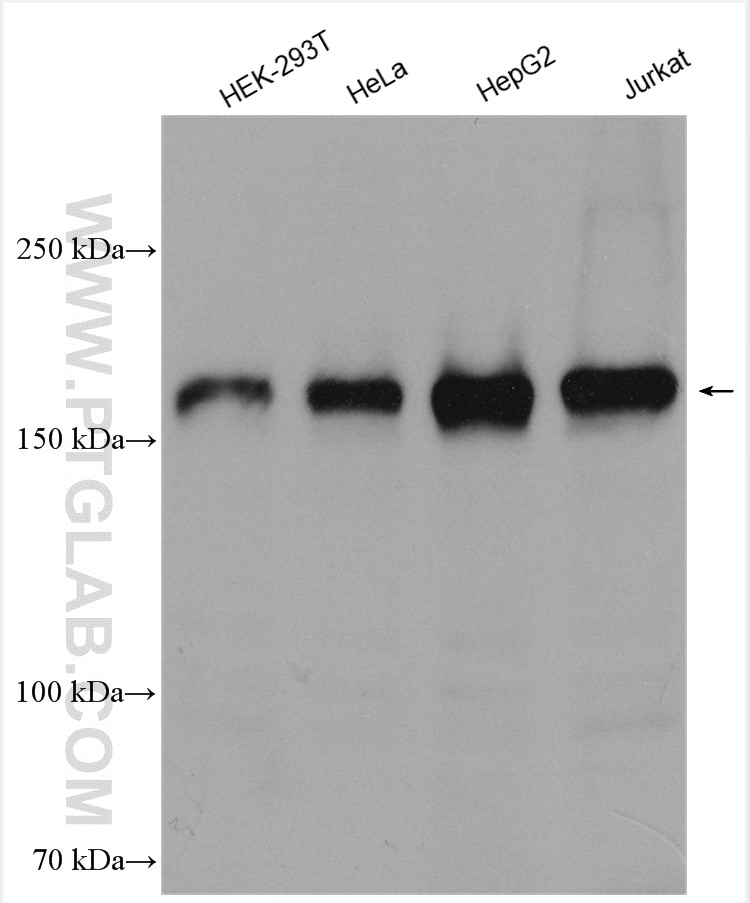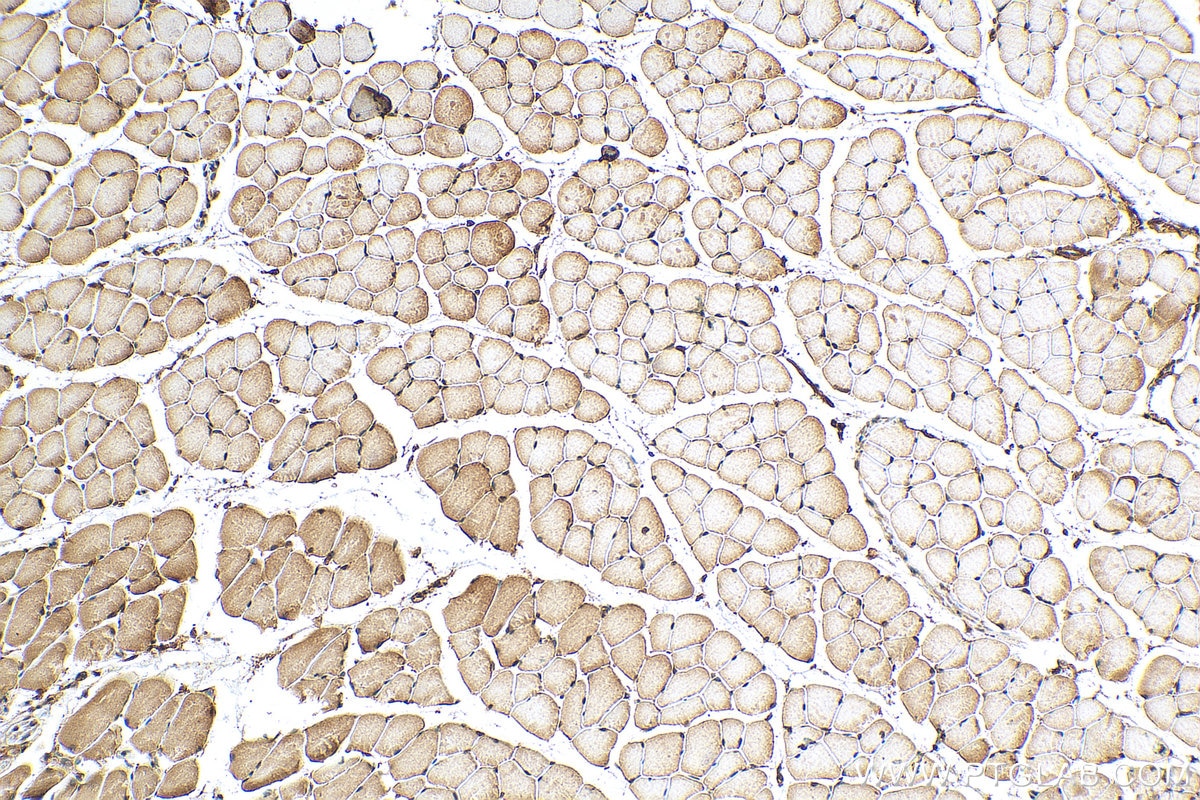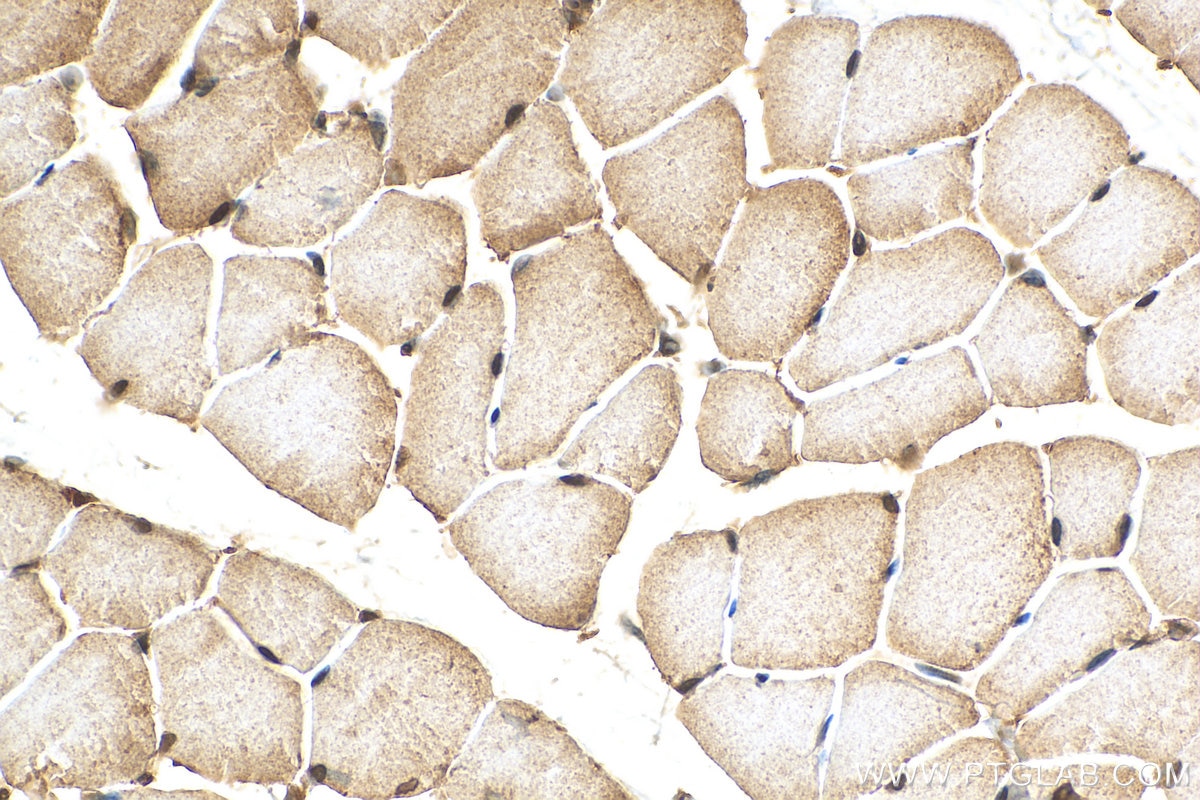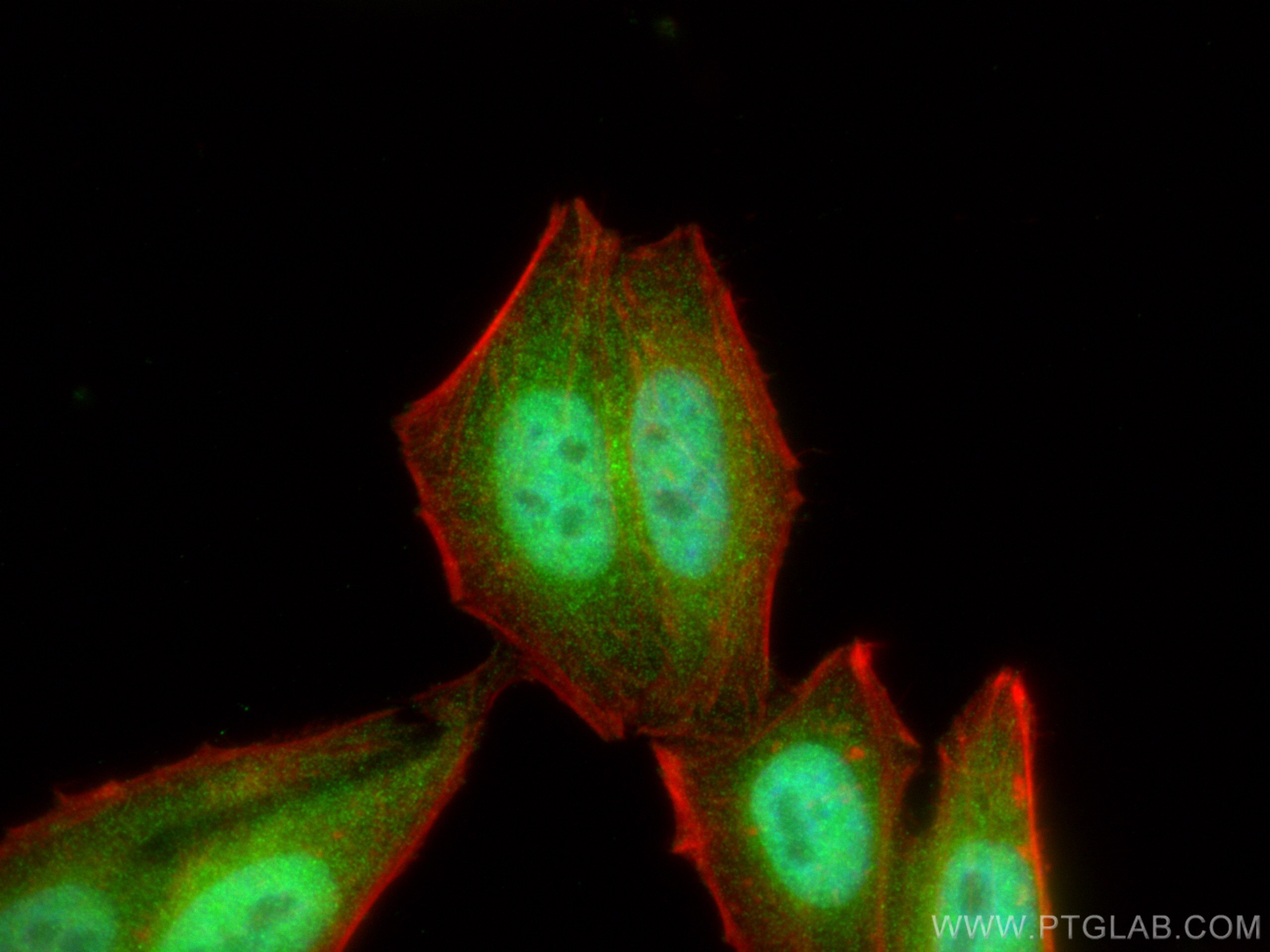- Phare
- Validé par KD/KO
Anticorps Polyclonal de lapin anti-WAPL
WAPL Polyclonal Antibody for WB, IHC, IF/ICC, ELISA
Hôte / Isotype
Lapin / IgG
Réactivité testée
Humain, souris et plus (1)
Applications
WB, IHC, IF/ICC, ChIP, ELISA
Conjugaison
Non conjugué
N° de cat : 16370-1-AP
Synonymes
Galerie de données de validation
Applications testées
| Résultats positifs en WB | cellules HEK-293T, cellules HeLa, cellules HepG2, cellules Jurkat |
| Résultats positifs en IHC | tissu de muscle squelettique de souris, il est suggéré de démasquer l'antigène avec un tampon de TE buffer pH 9.0; (*) À défaut, 'le démasquage de l'antigène peut être 'effectué avec un tampon citrate pH 6,0. |
| Résultats positifs en IF/ICC | cellules HepG2, |
Dilution recommandée
| Application | Dilution |
|---|---|
| Western Blot (WB) | WB : 1:500-1:2000 |
| Immunohistochimie (IHC) | IHC : 1:50-1:500 |
| Immunofluorescence (IF)/ICC | IF/ICC : 1:200-1:800 |
| It is recommended that this reagent should be titrated in each testing system to obtain optimal results. | |
| Sample-dependent, check data in validation data gallery | |
Applications publiées
| KD/KO | See 3 publications below |
| WB | See 11 publications below |
| IF | See 2 publications below |
| ChIP | See 3 publications below |
Informations sur le produit
16370-1-AP cible WAPL dans les applications de WB, IHC, IF/ICC, ChIP, ELISA et montre une réactivité avec des échantillons Humain, souris
| Réactivité | Humain, souris |
| Réactivité citée | rat, Humain, souris |
| Hôte / Isotype | Lapin / IgG |
| Clonalité | Polyclonal |
| Type | Anticorps |
| Immunogène | WAPL Protéine recombinante Ag9280 |
| Nom complet | wings apart-like homolog (Drosophila) |
| Masse moléculaire calculée | 142 kDa |
| Poids moléculaire observé | 160-180 kDa |
| Numéro d’acquisition GenBank | BC017393 |
| Symbole du gène | WAPL |
| Identification du gène (NCBI) | 23063 |
| Conjugaison | Non conjugué |
| Forme | Liquide |
| Méthode de purification | Purification par affinité contre l'antigène |
| Tampon de stockage | PBS with 0.02% sodium azide and 50% glycerol |
| Conditions de stockage | Stocker à -20°C. Stable pendant un an après l'expédition. L'aliquotage n'est pas nécessaire pour le stockage à -20oC Les 20ul contiennent 0,1% de BSA. |
Informations générales
The wings apart-like (WAPL, or WAPAL) protein was originally identified as a gene product that potentially regulates heterochromatin organization in Drosophila melanogaster. Human WAPL is a cohesin-binding protein that promotes sister-chromatid resolution in mitotic prophase. Overexpression of WAPL disturbs mitosis and cytokinesis, and contributes to tumor progression by induction of chromosomal instability. WAPAL has a predicted molecular weight of 140 kDa, however, as a result of its extensive phosphorylation it separates on a SDS gel as a band of approximately 160-180 kDa.
Protocole
| Product Specific Protocols | |
|---|---|
| WB protocol for WAPL antibody 16370-1-AP | Download protocol |
| IHC protocol for WAPL antibody 16370-1-AP | Download protocol |
| IF protocol for WAPL antibody 16370-1-AP | Download protocol |
| Standard Protocols | |
|---|---|
| Click here to view our Standard Protocols |
Publications
| Species | Application | Title |
|---|---|---|
Nat Genet WAPL maintains a cohesin loading cycle to preserve cell-type-specific distal gene regulation.
| ||
Sci Adv RNA polymerase II is required for spatial chromatin reorganization following exit from mitosis. | ||
J Clin Invest Allogeneic T cell responses are regulated by a specific miRNA-mRNA network. | ||
Cell Rep Cohesin Removal along the Chromosome Arms during the First Meiotic Division Depends on a NEK1-PP1γ-WAPL Axis in the Mouse. |
Avis
The reviews below have been submitted by verified Proteintech customers who received an incentive for providing their feedback.
FH Zhenmin (Verified Customer) (12-05-2019) | This antibody is very specific and works very well with immunohistochemical staining for formalin fixed and paraffin embedded tissue.
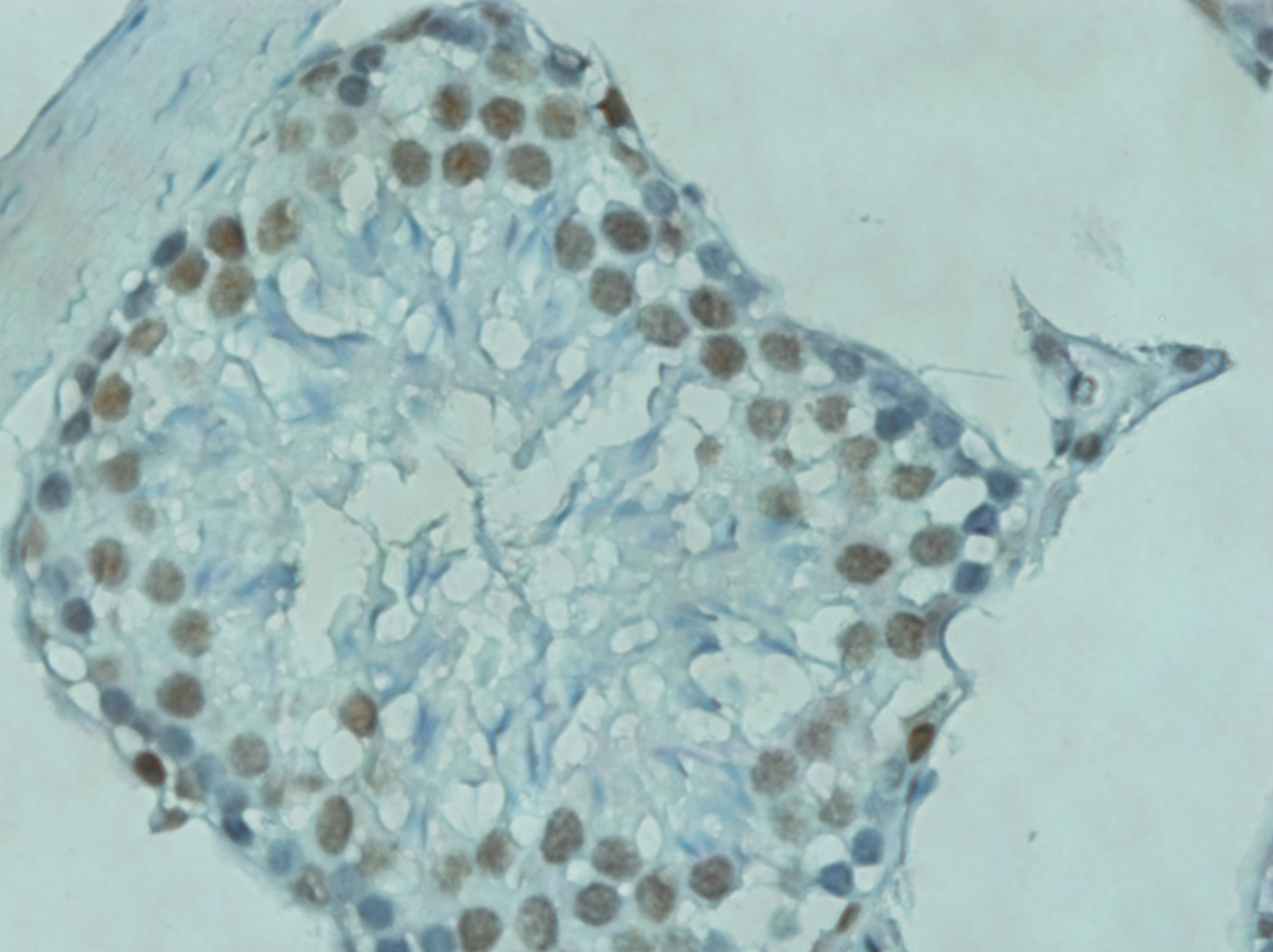 |
